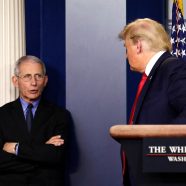
The world has been turned upside down with this Coronavirus. No one can accurately predict the future, although everyone agrees that things will never be the same. Everybody wants to be safe and healthy, plus a speedy economic recovery, but how? There is extensive confusion as we hear so many contradictory explanations. People want leadership that is credible, transparent and trustworthy. Words count, and promises are important for establishing and sustaining trust. What we have now however are two different communication approaches: (1) emotional personified by Trump and (2) rational, best demonstrated by another New Yorker, the leading epidemiologist, Anthony Fauci.
Despite an unquestioned pattern of overpromises and falsehoods, Trump retains a solid base of support that is emotionally committed to him. There are a lot of Americans who are unhappy with the political establishment, and still see Trump as a powerful, if unconventional force, a classic disrupter who will enhance their personal freedom to find a better life. Trump is egocentric, inconsistent and undisciplined, and his entire approach to managing the country and this pandemic reflects these qualities. In particular it is based on his “gut instinct” to sustain this emotional connection with his base. This emotional link was a major reason for his election and is still the key to keeping his base loyal to him.
How Neurologists View Emotion
Neurologists have proven that behavior (e.g. decisions for selecting brands, even political candidates) is dictated primarily by the mid part of the brain (Limbic) that controls emotions. For example, In Paul MacLean’s model of the “Triune Brain”, there are three parts:
- Brain stem or cerebellum which shapes instinctive and survival reactions
- Limbic system controlling emotions and feelings, plus memories and habits
- Neo-Cortex which is the cognitive center for language, abstract thought, rationalizing, etc.
Trump is a pro at creating his own distinct brand based mainly on establishing this emotional relationship with those frustrated Americans, most of whom are swayed primarily by feelings (Limbic part of brain) over rational thinking (Nee-Cortex part of brain). While most of his claims are exaggerated or at least questionable, they are all designed to re-enforce that core emotional cord of his base. Most of them still believe he is trying hard and no one could do a better job.
However this pandemic presents a very different situation from simply selecting a product, service or person. Now we’re talking about health and survival, issues of far more compelling importance. In this life or death environment Americans are starting to worry about Trump’s inconsistent promises. More and more they want the indisputable FACTS that will enable them to trust a leader and approach.
The Growing Appreciation for Scientific Facts
The overall search for trust is now turning to science, which offers alternative, cognitive explanations and promises, all based on facts. While scientific evidence is being espoused by many doctors, the one who presents the most trusted option compared to Trump is Anthony Fauci. Both are New Yorkers, but their backgrounds couldn’t be more different, which has shaped their style and credibility. Trump is from Queens, grew up with a silver spoon, and was sent away to a military academy as a teenager. Fauci grew up in Brooklyn, went to the reputable Regis High in Manhattan, was captain of his basketball team there, and has successfully served six different presidents. While Trump’s career as a real estate developer (and reality TV showman) has been focused on building his own fortune and self-image, Fauci’s life as a physician and immunologist has been devoted to serving others.
Emotional connections have been the core driver behind Trump’s loyalty among his base so far, which is consistent with how neurologists see feelings as dominating human behavior. But the high risks and uncertainty for Covid-19 have made more Americans desperate for scientific facts they can believe and trust, especially for issues like when the economy should be opened. For example, a recent Pew Research study found two thirds of Americans were more concerned that restrictions will be lifted too quickly, a conclusion that is supported by scientific projections.
The dangers from this coronavirus and the credibility of respected doctors like Fauci have led to a growing preference for cognitive facts people can trust versus arbitrary, “gut instinct”, emotion-based predictions. Decision making controlled by emotional feelings will always be important, and as the world changes may become the key for Trump’s future success again. But today trust is shaped more by the unprecedented risks of this pandemic and by respected, non-adversarial leaders who focus on scientific facts like Dr. Fauci.


